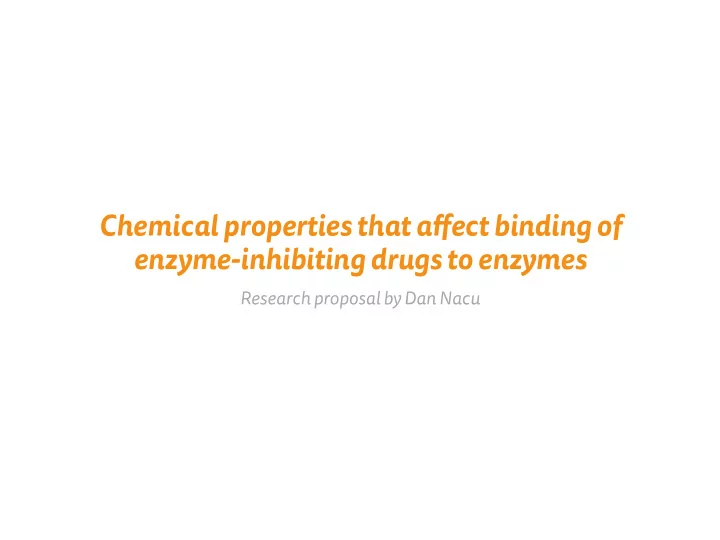

Chemical properties that a fg ect binding of enzyme-inhibiting drugs to enzymes Research proposal by Dan Nacu
?
Global Pharmaceutical Industry $400,000,000,000 http:/ /www.who.int/trade/glossary/story073/en/
Drug Development Computer Simulations
How can it be done? Simulation Models Shape Complementarity Chemical Properties
How can it be done? Chemical Properties Solvent Accessible Surface Area Hydrophobicity Electrostatics Van Der Waal’s Forces Residue Pair potential Desolvation Energies Atomic Contact Energies Complementary Determining Regions etc… A lot of options…
Its been done before… in a di fg erent way. Li et al, 2007 Their Equation
Its been done before…in a di fg erent way. Li et al, 2007 Their Results
How will this be di fg erent? Introducing HINT H ydropathic INT eractions The HINT Equation
Why HINT? Its more true to life
HINT j i two atoms
HINT a ffj nity score for single interaction All interactions are summed at end
HINT hydrophobic atom constant hydrophobic atom constant i j hydrophobic character of interaction sum Log P 1-octanol/water
HINT accessible (inside) non-accessible
HINT Electrostatics hydrophobic-hydrophobic hydrophobic-polar acid-base hydrogen bond polar-polar acid-acid base-base returns +1 or -1
HINT Atomic Distance j j j i decreased interaction
HINT Lennard-Jones Potential j j j i i i too close too far just right
What can be done? By weighing each variable in HINT, the most important chemical property for enzyme/ inhibitor complexes can be found. Why exponents?
Why exponents? Li et al HINT
Overview of Experiment Benchmark 5 PDB File Modi fj ed Equation Similarity to True-Structure Decision
What’s the experiment? Start with 46 enzyme inhibitor complexes from the Benchmark 5.
What’s the experiment? Bound Unbound FTDock What’s FTDock?
FTDock Rotation & translation in 3D space to fj nd all possible con fj gurations.
What’s the experiment? FTDock Huge list of possible complexes
What’s the experiment? Huge list of possible complexes L_RMSD Testing Ligand_Root-Mean-Square-Deviation What’s L_RMSD Testing?
L_RMSD Testing Σ ( ) 2 atom x 1 - atom x 2 total # of atoms
What’s the experiment? L_RMSD Testing Top 20 Structures
What’s the experiment? Top 20 Structures For 46 complexes = 920 simulated structures. For both bound and unbound, 1,840 total Lets look at just one
What’s the experiment? Why these exponents?
What’s the experiment? In the end… 23,000 HINT Scores for Bound 23,000 HINT Scores for Unbound 6,325,000 scores 46•20•5•5 = 23,000
What’s the experiment? Highest 50 HINT Scores for each complex L_RMSD Testing Find best match for each complex
Interpreting result Enzyme-Inhibitor Simulated Complex Best L_RMSD Score: 4 Å b ij = a i a j S i S j (T ij ) 1.5 R ij + r ij HINT weight used: Electrostatics
Possible Results
Possible Results
In the future… Di fg erent models (besides HINT) Di fg erent complexes (besides enzyme/inhibitor)
Questions?
Extras
Electrostatics Table Kellogg and Abraham, 2001
Recommend
More recommend